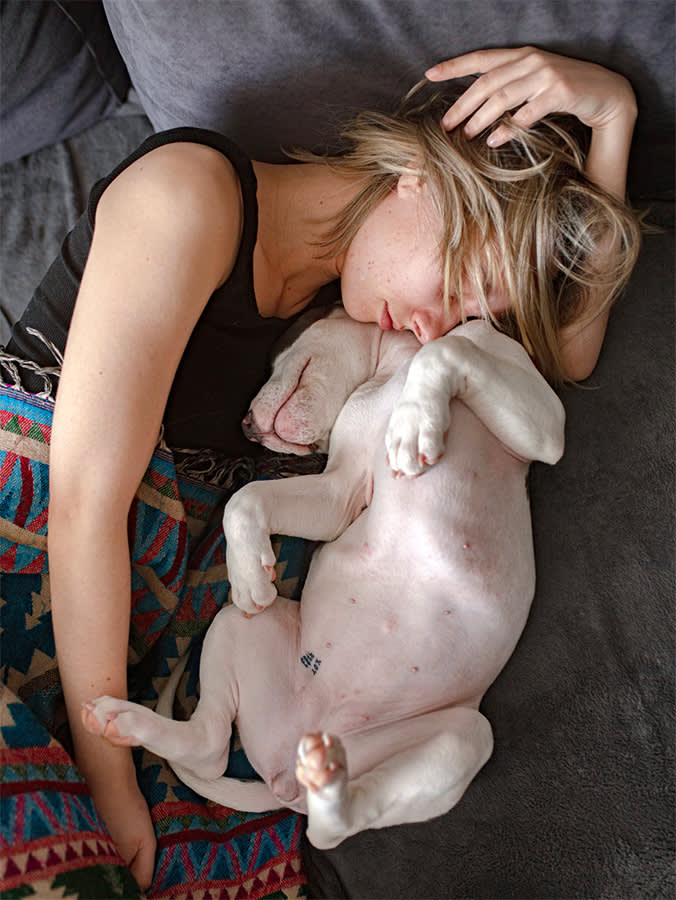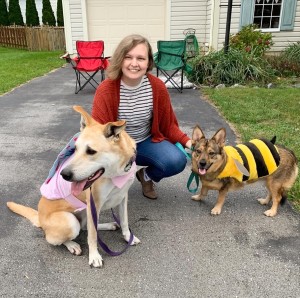Why Is My Dog Twitching In Their Sleep?
No need to panic, but keep that video you just took in case a vet needs to see it.

share article

Your pet wants you to read our newsletter. (Then give them a treat.)
Every dog parent has been there: You’re watching your pup snooze peacefully when their leg begins to kick. Maybe they even whimper or growl in their sleep. These little twitches can definitely be cute, but should you be worried? Is it a sign of a more serious issue, or is your dog just desperately chasing a squirrel in their dreams?
Fortunately, brief, intermittent twitching in your dog’s sleep is completely normal — and yes, your dog is dreaming, likely about the experiences of their day. But why do dogs twitch in their sleep, and is there ever a reason to consult your vet? Learn all about the dog sleep cycle and why dogs twitch when sleeping.
What does it look like when a dog twitches in their sleep?
When your dog twitches in their sleep, they may kick lightly at the air with a back leg, or a front limb may twitch. Sleep twitching usually happens in a dog’s legs, but they may also move their head or wag their tail. Usually, dogs are lying on their sides when twitching and may even move more than one paw in a paddling motion. You may also notice your dog’s eyes moving behind their closed lids, irregular breathing, and even vocalizing, like whimpers, low growls, or soft barks.
Is twitching during sleep harmful to my dog?
In most cases, twitching during sleep is completely normal for dogs and can happen during the rapid eye movement (REM) stage of sleep. During REM sleep, a part of the brain called the pons controls muscle movement, and sometimes it’s ineffective, leading to twitching. These small muscle spasms are more frequent in puppiesopens in a new tab, who have less developed brains, and in senior dogs.
So, if you notice your dog keeps twitching in their sleep, don’t wake them and interrupt their deep snooze. You only need to worry if twitching becomes violent or lasts longer than 30 seconds.
Stages of a Dog’s Sleep Cycle
Dogs have the same sleep cycle as humans, just in a much shorter time frame. Researchers have found that the canine sleep cycleopens in a new tab includes an average of 12 minutes of non-REM sleep followed by six minutes of REM sleep. Compare this to 90 minutes of non-REM sleep followed by 60 minutes of REM for humans.
During REM sleep, dogs dream just like humans. Their breathing becomes shallower and more irregular, and their eyes might move behind their closed lids (this is where the “rapid eye movement” name comes from). Because dogs sleep significantly more than humans — about 12 to 14 hours a day — they’re moving through the sleep cycle multiple times, shifting in and out of deep sleep and puppy dreams, which can often lead to twitching
Do dogs dream?
While a dog sleeps, whether for a quick nap or a long, overnight snooze burrowed under the coversopens in a new tab, their brain processes the things they’ve seen and experienced throughout their day in dreams. Scientists know this because dogs have similar sleep patterns to humans, and their brains go through the same stages of electrical activity observed in dreaming humans.
We can’t know exactly what dogs dream about, but researchersopens in a new tab have observed some breeds performing behaviors specific to their breed. For example, sleeping Pointers tend to point! It’s most likely that a dog dreaming thinks about what they do during the day, like playing, going on walks, or snuggling with their favorite humanopens in a new tab. That’s right, your dog could be dreaming about you.
What causes dogs to twitch in their sleep?
There are several reasons why your dog twitches in their sleep, and while a harmless dream is the most likely, it’s important to be aware of other potential causes.
Dreaming is the most likely cause for your dog twitching in sleep, indicating that your pup is in the later stages of REM sleep.
Muscle spasms can be related to growth and development in puppies and can also occur in healthy senior dogs.
Pain could be the cause of twitching, especially stiffness or arthritis.
Medical conditions, such as muscle or nervous system disorders, can cause twitching in dogs. Myokymiaopens in a new tab is a condition that causes twitching on a dog’s face during sleep but is usually harmless unless it also occurs when the dog is awake.
Are there any cases where twitching during sleep is concerning?
In general, a dog twitching in their sleep is completely normal, and you should just “let sleeping dogs lie,” as the saying goes. Waking your dog from deep sleep can prevent them from getting enough rest, which can negatively impact their well-being. But there are a few signs to look out for that can indicate a more serious problem:
Long periods of twitching: A dog’s sleep twitching shouldn’t last more than 30 seconds and should be intermittentopens in a new tab.
Violent twitching: Tremors in your dog’s entire body or a dog shaking in their sleep could indicate a neurological issue.
Twitching that is accompanied by other symptoms, such as seizures or foaming at the mouth, is likely caused by a more serious health condition.
When should I seek veterinary advice for my dog’s sleep twitching?
If you notice your dog’s entire body shaking when sleeping or that their body is more rigid, contact your veterinarian immediately. Stiff limbs and violent movement are often signs of seizures, which can be caused by a number of medical conditions, including epilepsy and cancer.
Should I take a video of my dog’s sleep if I’m concerned about the twitching?
A dog twitching in sleep is generally harmless. If you notice that your dog twitches frequently and for more than 30 seconds at a time, you may want to record their sleep so you can show the video to your vet.
Can diet affect my dog’s sleep and twitching?
Research has not determined whether a dog’s diet can impact their sleep and result in more twitching. But if your dog consumes foods that are toxic to them, like chocolate, they can experience tremors or shivering. However, these behaviors are usually accompanied by other symptoms, such as vomiting and diarrhea. If you suspect that your dog has consumed a toxic foodopens in a new tab or substance, contact your vet immediately.
Can certain medications cause twitching in dogs during sleep?
Just like their human parents, dogs can experience side effects from medications. While it’s unlikely that twitching can result from medication, in some rare cases, certain drugs, such as antibiotics, insulin, flea and tick medications, and anti-anxiety medications, can cause tremors. If you notice that your dog shakes in sleep, consult your veterinarian.
Is regular exercise important for preventing sleep disturbances in dogs?
Regular exercise can help your dog stay healthy, not just physically, but mentally, by reducing stress. Too much stress can lead to poor sleep, so ensuring that your dog gets plenty of exercise can help them sleep soundly.
While seeing your dog twitch in their sleep can be concerning at first, this behavioropens in a new tab is just part of their natural sleep cycle. So let your pup dream about chasing that rabbit, meeting friends at the dog park, or their favorite person in the world: you.
FAQs (People Also Ask):
What causes dogs to twitch in their sleep?
Dogs twitch in their sleep when they enter the late stages of REM sleep and are dreaming. You may also hear your dog whimper during this sleep stage, or they may wag their tail.
Is twitching during sleep harmful to my dog?
Twitching during sleep is perfectly normal for dogs and is not a cause for concern unless it becomes violent or more frequent.
Should I wake up my dog when they’re twitching in their sleep?
You should avoid waking up your dog when they’re sleeping, even if they appear to be having a nightmareopens in a new tab. Touching a sleeping dog may startle them, and they could bite or scratch you involuntarily. If you do feel the need to wake your dog, call their name loudly or make a noise and then reassure them if they become startled.
Are there cases where twitching during sleep is concerning?
Twitching during sleep is only a cause for concern if it becomes violent or lasts longer than 30 seconds at a time.
Can diet affect my dog’s sleep or twitching?
Research hasn’t found whether a dog’s diet affects their sleep, but if a dog consumes toxic foods like chocolate, they can experience tremors and shivering and need to be taken to the vet immediately.
Can certain medication cause twitching in dogs during sleep?
In rare cases, some medications can cause tremors in dogs. Let your vet know if you notice any side effects from prescribed medications.
Is regular exercise important for preventing sleep disturbances in dogs?
Regular exercise can help reduce stress and allow your dog to sleep deeply and restfully.
When should I seek veterinary advice for my dog's sleep twitching?
Contact your vet if your dog’s twitching becomes more violent, lasts for longer than 30 seconds, or their body feels stiffer or more rigid.
Should I videotape my dog’s sleep if I’m concerned about the twitching?
If your dog’s twitching becomes more frequent and lasts for more than 30 seconds, you may want to take a video of your dog sleeping so you can show the vet.
References

Savannah Admire
Savannah Admire is a writer, editor, and pet parent to two dogs and a cat. When she’s not writing, you can find her reading, playing Animal Crossing, or being an obnoxious nerd about her favorite movies and TV shows. She lives in Maryland, where she constantly debates whether or not to get a third dog.